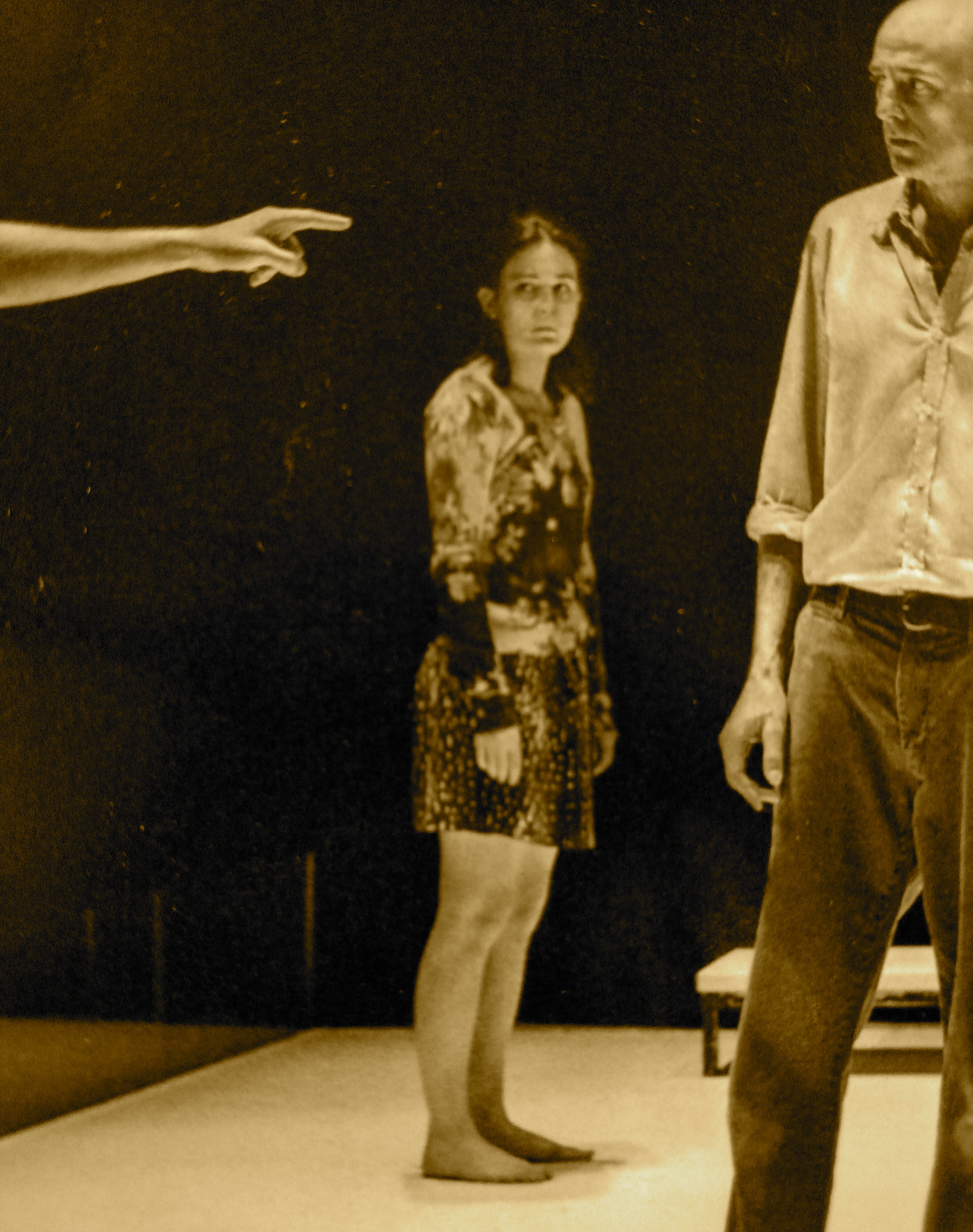I took an onstage seat for the Young Vic production at the Lyceum in New York. First row, right, center. I stared at a black scrim, an aisle’s width away. Two hours later, there was a drop of red liquid on my shoe. It dissipated harmlessly. I sat breathless. I wasn’t able to go with the play’s last words, which tried to validate the life of a man who seemed to me a hypocritical brute. But then, maybe, perhaps, that points to why Ivo van Hove’s VIEW FROM THE BRIDGE is historically great theater: it is too unbending not to remind us that there are men, even the playwright Arthur Miller, who admire such men, and make excuses for them, to the extent, in Miller’s case, of building around him the grandeur of a tragedy. I don’t know that van Hove would agree with me, only that he is too rigorous a director to let off easily a hard truth. The play is thrown naked on the altar and can’t escape, before its death, the reality of the lie it tells.
Mark Strong, as the man in question, Eddie Carbone, has surely learned to love the creature, ’50s family man and pillar of the Brooklyn waterfront. Actors need to do that, love the people they play; otherwise they couldn’t bear to become them; not the likes of Eddie, obsessed with honor, perverse imaginings, and his own preeminence. No, I can’t believe that Strong likes him much, but he certainly loves him, as much maybe as Eddie wants Catherine, whom he has brought up, his wife’s orphaned niece, disconcertingly become a young woman, and so interested in and of interest to young men like Rodolpho, acted with a boyish twinkle by Russell Tovey, the illegal immigrant the Carbones are sheltering, who is blonde, despite being Italian, sings, and talks in a high voice, and so, to Eddie, isn’t “right.” Eddie, too proud to face and master his desires, lets them warp his actions, even if he doesn’t act directly upon them (or has he?), and Catherine’s attraction to Rodolpho provokes a crude homophobic urge: the image he has of Rodolpho’s sexuality attracts him and threatens his own. Strong’s performance, and van Hove’s staging, made me hate him by the end. The appeal from his lawyer (he needs one) that we find something admirable in him, fails with a thud, despite actor Michael Gould’s best tragic-sympathetic pose. Nicola Walker’s passionate efforts as Beatrice, his wife, don’t do it either. Leave it to Strong to redeem him, with an actor’s love. Miller fancied him a classic hero with a flaw. Van Hove’s production is too strong to let him pull it off.
Its strength comes from going all the way with Miller’s pretensions. Love the play like Strong does Eddie. Strip it to ritual, purify it to sacrifice. Raise the scrim on it, like an execution chamber revealed at dawn. Bound it by a low black bench; enact it on a pure white floor, without shoes or socks; leave them at the door if you come with them on; Catherine is bold enough to wear a pair, high-heeled for a night out, and is censured for it. She’s the one I remember the most, played by Phoebe Fox, and for a particular moment, an accusatory stare that, had it slipped an inch to the left, might have set upon me rather than Eddie. In the narrow of her eyes are contempt and determination and defiance at once: the absurd tragedy of Eddie Carbone obliterated by a gaze. Michael Zegen, as Marco, Rodolpho’s brother, does it too, eyes lingering on Eddie in an insouciant dis, reposed on the rear wall, fearless, like a soldier at ease. He’ll have his moment, soon enough, with Eddie, and humiliate him with a chair.
That event, and all that follows, will have the power it does because van Hove exposes the raw psychic architecture of the drama, vivified by Jan Versweyveld’s décor and sound from Tom Gibbons that hums like blood in the ear. Miller’s attempt to recuperate the ambiguity of Eddie’s character from the tragedy of his actions is futile: the logic of tragedy at its most rigorous is to strip the flaw of its ambiguity. Van Hove has nothing if not rigor. Miller’s play is made great as never before, its own error of judgment the final irony.
For information, click here.

3 responses to “A View From the Bridge”
[…] We have seen his Antigone, with Juliette Binoche, and his Lazarus, the David Bowie musical. His A View from the Bridge was epochal, a revindication of the nature and potential of theatrical experience. THE CRUCIBLE […]
[…] We have seen his Antigone, with Juliette Binoche, and his Lazarus, the David Bowie musical. His A View from the Bridge was epochal, a revindication of the nature and potential of theatrical experience. THE CRUCIBLE […]
[…] is the production half so theatrically innovative as it looks. It’s built on the template of Ivo van Hove’s brilliant View from the Bridge, which originated at the same theater. A glass box replaces a demarcated ritual […]